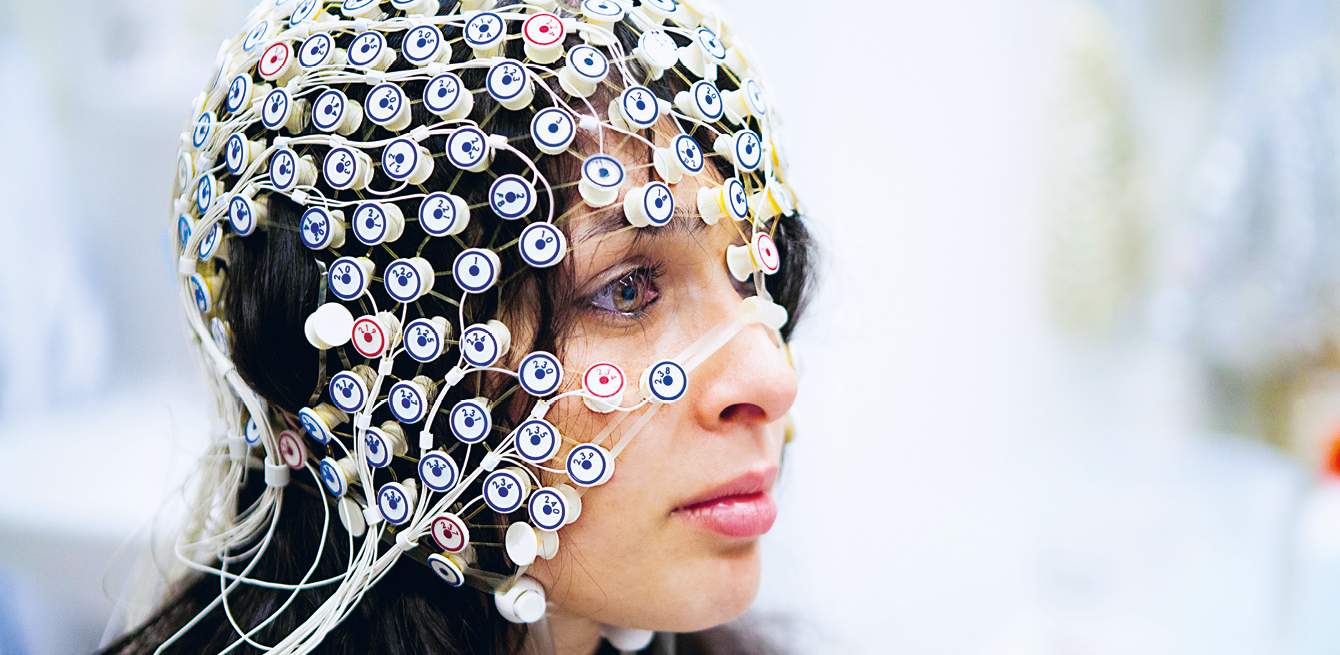
Brain capacity varies considerably from one person to the next. But a few common sense practices can help optimise that capacity. Ingesting substances can also play a role. A closer look.
ho has not dreamt of becoming smarter, sharper, more efficient? Capable of concentrating for lengthy periods and therefore learning huge amounts of information? Can the brain, that organ that is so essential to each of our daily activities, really be trained to perform better? And if so, how?
“The frontal lobes take up almost half of the brain and mainly deal with executive functions,” explains Gilles Allali, director of the Leenaards Memory Centre of the CHUV-UNIL. That means sending a signal to a part of the body to execute an action, such as walking, bringing a fork to your mouth, or using your voice. The rest of the brain’s functions are divided between memory, attention, concentration, language, calculation and vision.
And we are all far from equal in this respect. “Cognitive abilities are about half influenced by genetic factors,” says Enrico Amico, a researcher at the Institute of Bioengineering at EPFL. Incidentally, he and his team announced a major discovery at the end of 2021: each of us has our unique “brain fingerprint”, like the fingertips. The other half of our cognitive abilities is shaped by environmental factors: an individual’s education level and their parents’ education level, as well as socio-economic status while growing up. All these factors contribute to what is referred to as an individual’s cognitive reserve, Gilles Allali says.
“Young people who do their homework while watching television and answering messages cannot assimilate the material they’re trying to learning properly. Multitasking is counterproductive most of the time,”warns the director of the Leenaards Memory Centre.
A method is available that teaches you to regulate your brain activity: neurofeedback. “Neurofeedback involves monitoring oscillations in an individual’s brain waves and showing subjects a measurement of that activity in real time to help them to understand how their brain works,” says Maël Donoso, who has a PhD in neuroscience. “And in doing so, they can modulate their behaviour to achieve a set outcome.”
For example, the amplitude of alpha frequency waves (8-12 oscillations per second) is a good indicator for patients who need to relax. This amplitude can be presented to them as a gauge, or other visual or auditory signals, and their goal will be to improve the indicator. Common practice is to show a film, which stops when brain activity is in a frequency bandwidth that is too high or too low. The individual then adapts their behaviour accordingly for the film to continue.
Currently, neurofeedback is mostly used to train patients to relax, in cases of chronic pain, migraines, sleep disorders, appetite disorders, or anxiety – as a complement to psychological treatment and/or medication. The method can also help with attention deficit disorders with or without hyperactivity, especially in adolescents. “These two applications have been widely validated in scientific research,” says Maël Donoso. However, patients should always consult qualified practitioners, who will use protocols based on research-backed data.”
So, what methods can we use to make sure our brain stays healthy? There is definitely no miracle food that you can eat every day to boost brainpower. However, researchers seem fairly certain that, in the case of neurodegenerative disease such as Alzheimer’s, a Mediterranean-style diet can slow a patient’s decline, compared to a fatty, red meat-based diet. “The studies that reported these findings were conducted on cohorts of thousands of patients, which means the research not only has credibility, but also variability at the individual level,” says Gilles Allali.
Learning a musical instrument also provides a strong stimulus for the brain. Music learning is like learning a new language, which hence develops the language mechanism. As a result, instrumentalists will have a more developed cognitive reserve than non-musicians, who do not regularly exercise these specific skills. This is strengthened by music’s link to emotions, and memory skills are more effective when associated with a particular emotional context. Here is an example: almost everyone can remember exactly what they were doing on 11 September 2001. But who remembers what they did on 12 September of the same year?
Tricks to keep the brain in good shape throughout childhood and adolescence, stages when we accumulate heaps of knowledge and information, derive mostly from common sense. For example, you should concentrate on one thing at a time.
Another important factor is sleep, both in quantity and quality. Also, attention span is not the same in children at age 5, 10 or 15. School curricula are based on scientific knowledge about how the brain works.
And to learn anything, repetition is key. “Learning is facilitated if the person is good at making connections between different pieces of information,” explains Gilles Allali. For example, someone with an extensive vocabulary will learn quickly, because they can make more connections between the words they already know.
Brain plasticity, or the ability to create new neural connections via synapses, evolves naturally over the course of a lifetime. A young stroke victim will recover much more easily than an elderly person.
There is no magic formula for stimulating the brain. And resources we may use to do that, which may seem effective at first, are not so in the long term. This is the case specifically with drugs, of all kinds. A case in point is substances that allow you to stay awake for long periods of time. Their side effects are often far more damaging to brain health than the apparent benefits they bring in the short term. “A significant proportion of our consultations is with alcoholics,” Gilles Allali says. “Some of them can’t be in public without having had a drink or two. But they lose the gain from disinhibition very quickly, as alcohol directly impedes memory and executive functions.”/